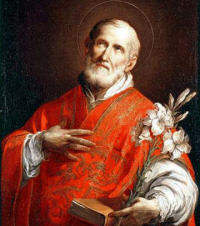Easter: May 26th
Memorial of St. Philip Neri, Priest; Minor Rogation Day
Other Commemorations: St. Eleutherius, Pope and Martyr (RM) ; Other Titles: Philip Romolo Neri; Apostle of Rome; Amabile Santo
» Enjoy our Liturgical Seasons series of e-books!
Today is the Memorial of St. Philip Neri (1515-1595), who was born in Florence and died in Rome. He lived a spotless childhood in Florence. Later he came to Rome and after living for fifteen years as a pilgrim and hermit was ordained a priest. He gradually gathered around him a group of priests and established the Congregation of the Oratory. He was a man of original character and of a happy, genial and winning disposition. A great educator of youth, he spent whole nights in prayer, had a great devotion to the Blessed Sacrament, and burned with an unbounded love for mankind. He died on the feast of Corpus Christi.
The Roman Martyrology also commemorates Pope St. Eleutherius (d. 189) (also Eleuterus), who governed the Church for 15 years, after the persecution of the Emperor Commodus. He was the 13th pope, He died in 189.
Today marks the beginning of the Minor or Lesser Rogation Days, which fall Monday through Wednesday preceding Ascension Thursday. Each of these days has a traditional Station Church.

Minor Rogation Days
Monday, Tuesday and Wednesday before the Ascension we commemorate the traditional dates for the Minor Rogation Days. These are days of prayer and formerly fasting, which take place every year on April 25th and the three days preceding the feast of the Ascension, the former being known as the Major Rogation and the latter as the Minor Rogations. The word “rogation” has its origins in the Latin word rogare, which means to supplicate or ask, and the purpose of Rogation Days is to beg God for His mercy, to turn away His anger, and to ask Him to bless the produce of field and garden while protecting us from natural disasters. The Rogation Days no longer appear on the General Roman Calendar, but are celebrated according to the local conference of bishops.
In the ancient Church Rogation days were quite common; some recurred annually, others were introduced at times of particular need, e.g., averting war or pestilence. The practice of three Rogation days before the feast of Christ's Ascension originated in Gaul (modern France). The saintly bishop Mamertus of Vienne introduced these days of prayer and penance when catastrophe threatened the city and its neighborhood about the year 450 A.D. Quickly the custom spread, and eventually it was incorporated into the liturgy of the Western Church.
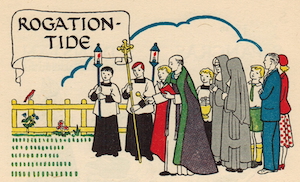
The celebration of Rogation Days consists in a procession followed by the Rogation Mass. In this procession we may sense the last remnant of the obsolete station processions observed by ancient Christians almost daily during Lent and during the first week after Easter. They would gather in a church known as the ecclesia collecta (hence the word "Collect") and from there walk in procession with the bishop and clergy to another church singing the Litany of the Saints and the Kyrie. The place of destination was known as the statio or station church, and holy Mass was celebrated there.
The four Rogation days have preserved the main elements of this venerable rite, an observance that we should respect and foster. For we should pray both perseveringly and in common, since special efficacy and power is attached to such prayer. Our prayer should not only be sincere and personal, we should also pray as units of a community, for to this type of prayer a special efficacy is attached. In the Rogation procession the Litany of the Saints is recited; it gives us an opportunity to call upon the entire Church triumphant to intercede in our behalf. The prayers concluding the Litany are usually beautiful and edifying.
What petitions will surely be answered?
Those which, according to Christ's words, are made in "the right spirit," and which are offered in the Name of Jesus, i.e., tend to further the kingdom of God. In the "Our Father" Christ has given us a summary of such petitions. Therefore, if our wishes are similar to those in the Lord's Prayer, we can assume that they will be heard. These petitions fall under three headings: God's kingdom, daily bread, sin. God will certainly grant petitions of this kind.
—Excerpted from The Church's Year of Grace, Pius Parsch
Highlights and Things to Do:
- Rogation Days: Cross Days (Activity)
- Rogation Day Prayers (Prayer)
- Read more about the Rogation Days at Catholic Saints Info.
- For more see Rogation Days.
Meditation for Monday of the Sixth Week of Easter
Minor Rogation Day: Catholic Prayer
1. Today we observe the first of the three rogation days which immediately precede the feast of the Ascension. In the mind of the liturgy our petitions are to accompany the Lord when He ascends into heaven. Christ in His ascension is our emissary, our messenger, our advocate. With this thought in mind the Church holds her rogation processions. "Arise, O Lord, help us and redeem us for Thy name's sake" (Processional antiphon). "Lord have mercy on us. Christ have mercy on us." May all the saints pray for us that we may obtain forgiveness and protection from our enemies and from the enemies of the Church; that there may be concord and harmony among all peoples; that there may be but one fold and one shepherd; that all men may be saved. The Church places these petitions on the paten, in the hands of the Lord, who is about to offer Himself up to the Father with her and for her.
2. "For where there are two or three gathered together in My name, there am I in the midst of them" (Matt. 18:20). The prayer of the Christian is necessarily a catholic (universal) prayer, made with and for the rest of the community. He who has once learned to pray in the spirit of Christ, knows that his prayer belongs to the whole Church. He knows that nothing is so foreign to the spirit of Christ and to a child of God as a narrow isolationism. "Woe to him that is alone" (Eccles. 4:10). The Christian knows that when he prays he is supported and abetted by his brethren. If he loves God with all his heart, he means not with his own heart alone, but with those of all his brethren. He feels that Jesus, Mary, the saints in heaven, and all earnest Christians on earth have but one heart, the heart of Jesus. By virtue of the power of the Holy Ghost, they have but one soul. When he prays, he knows that all the blessed in heaven and the baptized on earth pray with him, joining in one "Our Father," in one "Glory be to the Father, and to the Son, and to the Holy Ghost"; all join in the same "Hail Mary." When he prays, he has a deep consciousness of these others praying with him, and he joins his prayers to those of the community. Even when he is physically alone at prayer, he is ever conscious of the fact that no one can approach the Father as an isolated individual; he can come only if he is of one heart and one soul with his brethren. Otherwise the Father can have no pleasure in him. Men must approach the Father together, and present themselves as one body before Him.
He who prays alone is narrow, egotistical, and isolated. Separated from the community, he cannot ask "our Father" to give us this day our daily bread and forgive us our trespasses." He has failed to understand that this promise has been made only to the community of men, praying with one another and for one another. "Where there are two or three gathered together in My name, there am I in the midst of them," supporting their petition, supplementing it, and presenting it to the Father.
"No man cometh to the Father but by Me" (John 14:6). Only in communion with Him and through Him can we gain admission to God with our prayers. He leads us, since we are joined to Him, into the sacred presence of God. Through Him we have become the children of God and may now gain admission to the Father. Through Him and in Him we live, we feel, we work as children of God and fulfill the duties which are ours by reason of our being members of the family of God. We perceive also our obligation of approaching God as children when we pray.
In truth we can be said to be really praying only when we do so with Christ and through Christ. He must be in our midst. Wherever two or three are assembled in His name, there He is to be found among them if they are of one soul and one mind, united by mutual love. They are one in the measure in which they are one in their prayer, in heart, and in spirit. He stands in the midst of those who pray as their leader and guide. Now the Father hears the voice of His Son mingled with the prayers of the community. For this reason our prayers are answered. Through this union of prayer we established contact with Christ and with His prayers. He assimilates and unites the entire Church with Himself. God does not look with pleasure nor bestow His grace on those separated from the community, but only on the Church and on those in communion with the Church. The individual can hope to receive from Him only in the measure in which he unites himself to the community and to the Church. The more intimately we associate ourselves with the community, with the Church, with our parish, with our family, with the various religious families, the more pleased God will be with us, and the more fruitful becomes our prayer. "For where there are two or three gathered together in My name, there am I in the midst of them" (Matt. 18:20).
3. But what if we should be living at odds with our brethren? What if we are given to hatred and are guilty of a lack of charity both in word and in action? Can our prayer then be truly a prayer of the community, made in the name of Christ? It could hardly be so.
During the rogation processions the Church prays the Litany of the Saints. The Church militant unites with the Church triumphant, with Mary, the Queen of all saints, with the holy angels, with the apostles and martyrs, with the confessors and virgins. This union provides a vast multitude of holy souls praying as one. Joining her prayer to those of the saints, the Church cries out to the Lord, "be merciful," "deliver us from all evil," "we beseech Thee, hear us." Then she adds many prayers addressed to the Father. All these she offers to God through her intermediary, Jesus Christ. "For where there are two or three gathered together in My name, there am I in the midst of them." How fruitful these rogation processions must be, for the Church is sure to be heard! "He heard my voice from His holy temple, alleluia" (Introit).
—Benedict Bauer, O.S.B, from The Light of the World, Vol II
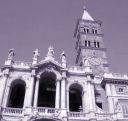
Monday of the Sixth Week of Easter, Monday of the Lesser Rogation Days
Station with Santa Maria Maggiore (St. Mary Major):
Following the disasters that afflicted the diocese of Vienne in Daughphiny in the fifth century, St. Mamertus instituted a solemn penitential procession on three days preceding Ascension Day. In 511 the Council of Orleans ordered it for the rest of France. It soon spread to the whole Church. The Rogation Days, though they remain an occasion for imploring God's blessing on the whole life of the Church, have in our days become a time of prayer for Him to bless the year's harvest. The singing of the Litany of the Saints has given its name to these three days of public intercession, but as at Rome there was already a similar procession on April 25, the Rogation Days came to be called the Lesser Litanies. The bishop may appoint another date for the Rogation Days, if it better meets local needs or customs.
For more on Santa Maria Maggiore, see:
For further information on the Station Churches, see The Stational Church.
St. Philip Neri
This gracious, cheerful saint was Rome's apostle of the sixteenth century (1515-1595). A peculiar charism was his burning love of God, a love that imperceptibly communicated itself to all about him. So ardently did this fire of divine love affect him during the octave of Pentecost in his twenty-ninth year that the beating of his heart broke two ribs. It was a wound that never healed.
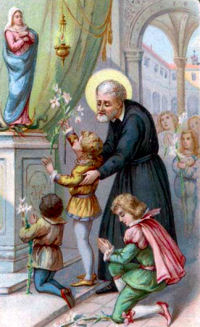 For fifty years the saint lived on in the intensity of that love which was more at home in heaven than on earth. Through those fifty years his was an apostolate to renew the religious and ecclesiastical spirit of the Eternal City, a task he brought to a happy conclusion. It is to his credit that the practice of frequent Holy Communion, long neglected in Rome and throughout the Catholic world, was again revived. He became one of Rome's patron saints, even one of the most popular.
For fifty years the saint lived on in the intensity of that love which was more at home in heaven than on earth. Through those fifty years his was an apostolate to renew the religious and ecclesiastical spirit of the Eternal City, a task he brought to a happy conclusion. It is to his credit that the practice of frequent Holy Communion, long neglected in Rome and throughout the Catholic world, was again revived. He became one of Rome's patron saints, even one of the most popular.
Philip Neri loved the young, and they responded by crowding about him. As a confessor he was in great demand; among his penitents was St. Ignatius. To perpetuate his life's work, St. Philip founded the Congregation of the Oratory, a society of secular clergy without religious vows. The purpose of his foundation was to enkindle piety among the faithful by means of social gatherings which afforded not only entertainment but religious instruction as well. Joy and gaiety were so much a part of his normal disposition that Goethe, who esteemed him highly, called him the "humorous saint." It was his happy, blithe spirit that opened for him the hearts of children. "Philip Neri, learned and wise, by sharing the pranks of children himself became a child again" (epitaph).
As a youth Philip Neri often visited the seven principal churches of Rome. He spent entire nights at the catacombs, near the tombs of the martyrs, meditating on heavenly things. The liturgy was the wellspring of his apostolic spirit; it should likewise motivate us to Catholic Action.
—Excerpted from The Church's Year of Grace, Pius Parsch
Patronage: Gravina, Italy; archidiocese of Manfredonia-Vieste-San Giovanni Rotondo, Italy; Rome, Italy; United States Army Special Forces; Venice, Italy; Philippines; laughter; joy; comedians; artists; writers
Symbols and Representation: Rosary; lily; angel holding a book
Highlights and Things to Do:
- St. Philip Neri was well known for his sense of humor. To honor him today try to laugh at yourself when something annoying happens, try to make someone else happy by your cheerful disposition. Catholic Cuisine suggests making Snickerdoodles in honor of his joyfulness.
- St. Philip's favorite feast was Corpus Christi. Make a visit to Jesus in the Blessed Sacrament.
- Read more about St. Philip Neri:
- Read St. Philip Neri: The Patron Saint of Joy and Apostle of Rome.
- See St. Philip's statues in the St. Peter's Basilica Colonnade and Founder Statue in St. Peter's Basilica.
- Philip's remains are honored in Chiesa Nuova in Rome. See Saints in Rome for more details about his body and relics.
Pope St. Eleutherius
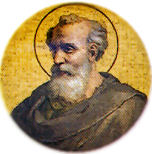 Eleutherius was born at Nicopolis in Greece. He was a deacon of Pope Anicetus, and was chosen to govern the Church during the reign of the emperor Commodus, the 13th pope. At the beginning of his pontificate he received letters from Lucius, king of the Britons, begging him to receive himself and his subjects among the Christians. Wherefore Eleutherius sent into Britain Fugatius and Damian, two learned and holy men; through whose ministry the king and his people might receive the faith. It was also during his pontificate that Irenaeus, a disciple of Polycarp, went to Rome, and was kindly received by Eleutherius. The Church of God was then enjoying great peace and calm, and the faith made progress throughout the whole world, but nowhere more than at Rome. Eleutherius governed the Church fifteen years and twenty-three days. He thrice held ordinations in December, at which he made twelve priests, eight deacons, and fifteen bishops for diverse places. He was buried in the Vatican, near the body of St. Peter.
Eleutherius was born at Nicopolis in Greece. He was a deacon of Pope Anicetus, and was chosen to govern the Church during the reign of the emperor Commodus, the 13th pope. At the beginning of his pontificate he received letters from Lucius, king of the Britons, begging him to receive himself and his subjects among the Christians. Wherefore Eleutherius sent into Britain Fugatius and Damian, two learned and holy men; through whose ministry the king and his people might receive the faith. It was also during his pontificate that Irenaeus, a disciple of Polycarp, went to Rome, and was kindly received by Eleutherius. The Church of God was then enjoying great peace and calm, and the faith made progress throughout the whole world, but nowhere more than at Rome. Eleutherius governed the Church fifteen years and twenty-three days. He thrice held ordinations in December, at which he made twelve priests, eight deacons, and fifteen bishops for diverse places. He was buried in the Vatican, near the body of St. Peter.
—Excerpted from The Church's Year of Grace, Pius Parsch.
Symbols and Representation: Model of Tournay cathedral; flaming oven; dragon; scourge; angel bearing scroll
Highlights and Things to Do:
- Read more about St. Eleutherius:
- Read this account of St. Eleutherius from the Lives of the Eartly Popes, Chapter 5, by Thomas Meynick.
- He is still buried in the Vatican near Saint Peter the Apostle.


